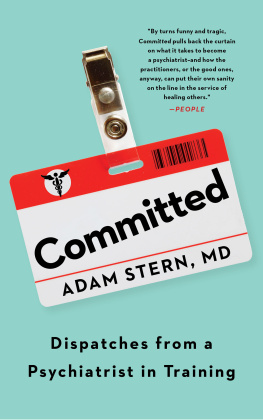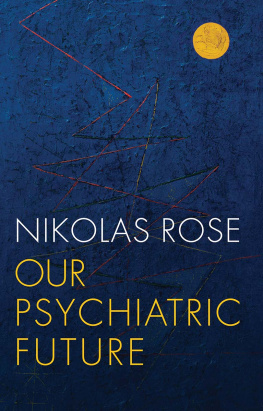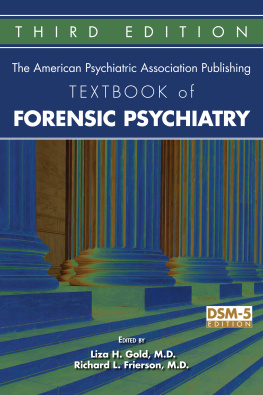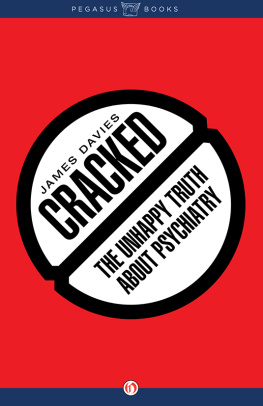A DVANCE PRAISE FOR
In a House of Dreams and Glass

A wonderfully knowing, edifying account of a modern professional apprenticeship, told by a talented, thoughtful, independent-minded storyteller with a marvelous eye and a ready ear for the concrete, everyday details of life, which, in their sum, tell us so very much. Dr. Klitzman stands for the very best in contemporary psychiatryhis sensitivity, his high intelligence, his goodness of heart, his willing, telling candor, his obvious interest in and concern for the needs and troubles of his patients.
Robert Coles, M.D.

Using his finely developed talents as writer and participant-observer, Dr. Klitzman captures the feelthe fascination and bitter frustrationof that unique rite of passage, the big city psychiatry residency, in a time of AIDS, homelessness, and shifting models of the mind and its ailments.
Peter Kramer, M.D., author of Listening to Prozac

It is a sort of Magic Mountain in reverse: the insular machinations of hospital living are related not through the patients but through the staff. The result is at once painful and cheery, instructive and entertaining, depressing and uplifting, sentimental and hardboiled. It is, finally, the unflinching depiction of both the fragile vanity and the solid beauty of the psychiatric profession in America. Robert Klitzmans book is an engrossing and meticulous recital of his three-year residency.
Ned Rorem

Thank you for purchasing this Simon & Schuster eBook.
Sign up for our newsletter and receive special offers, access to bonus content, and info on the latest new releases and other great eBooks from Simon & Schuster.

or visit us online to sign up at
eBookNews.SimonandSchuster.com

A LSO BY R OBERT K LITZMAN, M.D.
A Year-Long Night
R OBERT K LITZMAN , M.D.


SIMON & SCHUSTER
Rockefeller Center
1230 Avenue of the Americas
New York, New York 10020
www.SimonandSchuster.com
Copyright 1995 by Robert Klitzman, M.D.
All rights reserved
including the right of reproduction
in whole or in part in any form whatsoever.
SIMON & SCHUSTER and colophon are registered trademarks of
Simon & Schuster Inc.
Designed by Paulette Orlando
Library of Congress Cataloging-in-Publication Data
Klitzman, Robert.
In a house of dreams and glass: becoming a psychiatrist/[Robert Klitzman].
p. cm.
1. Klitzman, Robert. 2. PsychiatristsUnited StatesBiography.
3. PsychiatryStudy and teaching (Residency)United States. 4. Psychiatry.
I. Title.
RC438.6.K595A3 1995
616.89' 0092dc20
ISBN: 978-1-4516-1365-0
ISBN: 978-1-4516-8459-9 (eBook)
Note: All the details concerning staff, patients, and other people who appear in this book have been changed to protect confidentiality. None of the portraits of characters that appear here may be said to represent actual people. All are based on experiences I have had with many people in numerous hospitals located in different states and countries over many years.
ACKNOWLEDGMENTS
I want to thank many people for their help with this book. First and foremost, I am enormously indebted to the patients whom I had the privilege of caring for and getting to know. Without them, I could not have become a psychiatrist, nor learned what I did, and certainly could not have written these chapters.
I also want to thank my colleaguesthe other psychiatrists, residents, social workers, nurses, and staff members at the hospital where I trainedfor their instruction and insight.
This book could not have been completed without the assistance of several people and organizations, notably the Robert Wood Johnson Foundation Clinical Scholars Program at the University of Pennsylvania, under whose auspices I wrote most of this book, and in particular, Sankey Williams, Samuel Martin, Beryl Miller, Rosemary Stevens for her initial encouragement, and especially Rene C. Fox for her friendship, unfailing generosity and support, and astute comments on this manuscript.
For reading portions of this text in this and other forms, I am grateful to Rebecca Stowe, Cheryl Sucher, Richard A. Friedman, Scott Clark, Royce Flippin, Deborah Hautzig, and Ellen Currie and her writing class at Columbia University. I also wish to thank William McFarlane, Jules Ranz, and Susan Deakins in the public psychiatry fellowship at the New York State Psychiatric Institute; D. Carleton Gajdusek, Stacey Spence, and Mitchell Sally; and finally, the MacDowell Colony and its staff, where I worked on this manuscript, and Philip Koether, who was there both during my residency and while writing about it. I owe enormous gratitude to my agent, Kris Dahl, for her continuing faith in this project, often when I needed it most, and I also appreciated the help of her assistants, Gordon Kato and Dorothea Herrey. Finally, I am deeply indebted to my editor at Simon and Schuster, Robert Asahina, for his support, understanding, and insight through all the stages of this project, and to his assistant, Sarah Pinckney, for her many suggestions both large and small.
In memory of my father, Joseph A. Klitzman
CONTENTS
PREFACE
I wrote this bookon my experience of the process of becoming a psychiatristfor several reasons.
My training often surprised and bewildered me, and I undertook this account, in large part, to try to make sense of it. Frequently as a resident, I found myself in utterly unexpected situations, in which my preconceived ideas about the profession proved incorrect. In the peculiar otherworld of a psychiatric hospital, ordinary rules of logic and behavior dont always apply. As residents, we were pressured to conform to an often very rigid model of how psychiatrists should talk and respond to people, and we had to change the way we acted and viewed ourselves. Some of my encountersfor example, when I failed to realize certain things about others and myself right awayembarrassed me when I initially reflected back on them, after my training was over. Yet my beginners experiences taught me an enormous amount, marking the gap between my not being a psychiatrist and being one, and thus show how the profession socializes and transforms its members. How we as residents learn to think about ourselves and others shapes how we will approach patients for decades to come.
I also wrote this account after seeing that psychiatrists needed to become much more aware of the social, cultural, and human dimensions of their patients lives. Compassion was too often in short supply. It was easy to pigeonhole patients into narrow categories, to prescribe drugs, and to blame patients for the failures when treatments didnt work. But a wider, more humanistic view seems critical, to strengthen the field.
Next page











